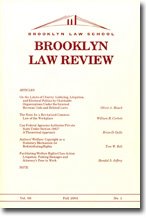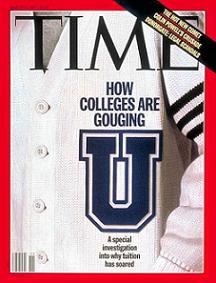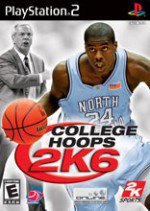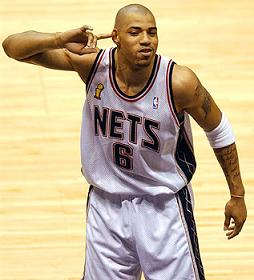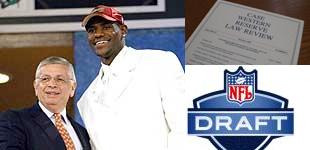Good morning. My thanks to Mike McCann and this week’s primary guest blogger, my friend and colleague Andre Smith for allowing me to participate in the discussion. I have been thinking for a while about blogging as a medium and as a scholarly exercise and about whether or not to take the plunge. I can think of this as my tryout, my September Cup of Coffee in the Show.
Finding an initial topic was easy when this story broke.
Ridiculed Over Broncos Jersey. Joshua Vannoy, a student at Big Beaver Falls Area Senior High School (in Pennsylvania, outside Pittsburgh) who wore a John Elway/Number 7 Denver Broncos jersey to school the Friday before the Broncos played the Steelers in the AFC Championship Game (which Pittsburgh one). In an ethnicity class, teacher John Kelly made Vannoy sit on the floor, in the middle of a circle of desks, to take a quiz in, during which other students (at Kelly’s suggestion) threw wadded-up paper at “the Broncos fan.” Kelly later claimed he was trying to teach a lesson about ethnic hatred and how it feels to be on the receiving end.
Tung Yin quotes the article at length.
Some of my recent work has focused on the link between sports and free expression and the constitutional protection for what we might call “sport speech” or “cheering speech.” In a forthcoming piece,
Wasserman on Fan Speech, I discuss what fans can and cannot say in the stands during games, arguing that the category of protecting cheering speech is extremely broad at the game. The Vannoy situation exemplifies a different aspect of cheering speech—the conversation about sports that occurs outside the confines of the game and that is similarly entitled to protection.
It is easy to chalk the case up to being about the teacher “taking sports WAY too serious.” And much of the media reportage has viewed this as a “lighter-side of the news” story; on ESPN Radio’s “Mike and Mike in the Morning,” it was reported as a fun, not-too-serious tale for a segment called “News of the Weird.”
But, as is often the case with sports speech, the lightness of the sport connection masks the seriousness of the underlying issue. The First Amendment violation would be obvious if we imagine a teacher doing exactly the same thing because a student wore, for example, a Boy Scout uniform or a t-shirt reading “Kerry for President” or “National Rifle Association” or “Proud Member of Local 242.” Or if he wore a black armband to protest the war. It would fly even less as a real-life lesson in how it feels to be discriminated against. It is true that lower courts give schools a great deal of (too much, I would suggest) leeway in regulating the t-shirts and clothing that students are able to wear in order to prevent “disruption” of school activities. But singling out a student for organized in-class abuse at the hands of his teacher and classmates because he espoused such messages goes far beyond the school’s authority.
Obviously, allegiance to the Denver Broncos (or John Elway) is not political in the same way as these other messages. But the freedom of speech generally is understood to protect more than the purely political; on libertarian-oriented individual liberty/autonomy and self-realization or self-actualization theories, it protects expression on the entire range of matters that define us as individuals, as fully formed humans ready and able to make and carry out life-affecting choices, as members of society, and as members of smaller communities within society. Certainly sports allegiance defines us and our personhood in this way, especially 16-year-old high-school juniors. Joshua Vannoy is a Denver Broncos fan and he decided to announce his membership in that community at an appropriate time—when everyone around him was announcing their membership in a rival community of Pittsburgh Steelers fans. Indeed, twisted as it was, Kelly’s actions themselves were an expression of his own allegiance.
For expressing that allegiance, Vannoy was subject to abuse (no matter how minor the abuse might seem—and minds may differ as to whether the shame and humiliation Vannoy claims is a genuine harm) at the hands of a government official. The nature of any harm he suffered to one side (a question that goes to damages, if he decides to bring suit), that sounds like precisely what the freedom of speech is supposed to prohibit and to protect individuals against.
For better or worse (I would suggest for the better), sport helps define modern American society. Perhaps because we are a society in which too many members have too much recreation time and too much disposable income. But perhaps, as sociologists and anthropologists suggest, sports fandom and team allegiance provides individuals access to an important and meaningful community, one that defines and benefits its members. The association between fan and team allows the fan to take a personal stake in the team’s success—personally experiencing the “thrill of victory” and the “agony of defeat,” the agony and the ecstasy of the competition. Sports fandom brings, the late A. Bartlett Giammati wrote, however briefly, a happiness, an absence of care and an escape. Or it brings self-imposed misery (I say this as a member of Cubs Nation and an alumnus of Northwestern University—Go ‘Cats).
That being so, it should not be surprising that fans want to express that allegiance and that passion, verbally and symbolically. And just as membership in the community of fans is a matter of import and worthy of protection, so too is expression of that membership.
Howard Wasserman, Associate Professor
Florida International University College of Law
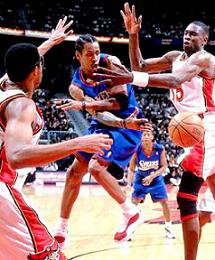 In a baffling move, Allen Iverson--who is the NBA's 2nd leading scorer and is 8th in assists per game--has been left off the U.S. Olympic team. Iverson had repeatedly expressed a desire to represent his country and to be on the team, which is directed by Jerry Colangelo and coached by Mike Krzyzewski. The team will be announced this Sunday and will include 22 NBA players, 2 college players, and 1 high school player. And no Allen Iverson. I don't care who else is on the team: Iverson should be on it. Just check out his stats from this season and where he ranks in the NBA:
In a baffling move, Allen Iverson--who is the NBA's 2nd leading scorer and is 8th in assists per game--has been left off the U.S. Olympic team. Iverson had repeatedly expressed a desire to represent his country and to be on the team, which is directed by Jerry Colangelo and coached by Mike Krzyzewski. The team will be announced this Sunday and will include 22 NBA players, 2 college players, and 1 high school player. And no Allen Iverson. I don't care who else is on the team: Iverson should be on it. Just check out his stats from this season and where he ranks in the NBA: